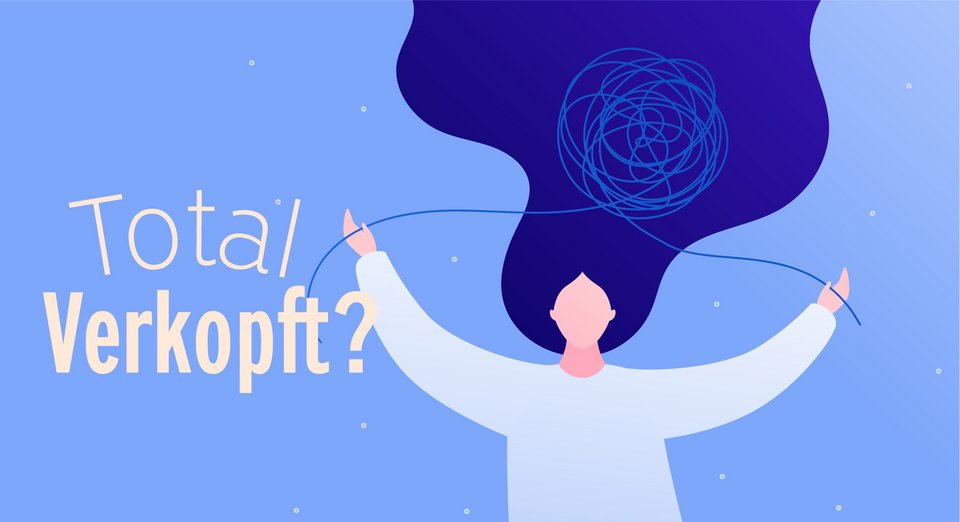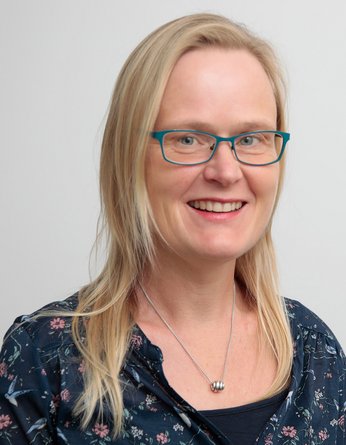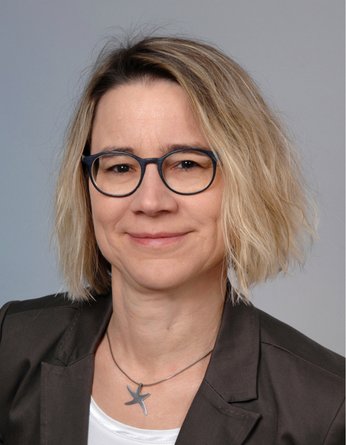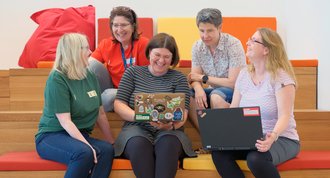
Not just since corona: the multiple stresses of private and professional life often push women to their limits - and beyond. Consultants Anette Bangert and Dr Antje Lumma-Sellenthin from healthcare provider B.A.D. talk about the reasons, the signs and their support services for employees.
one: Ms Bangert, Dr Lumma-Sellenthin, today we are talking about women's mental health. First of all, do you advise women differently to men?
Antje Lumma-Sellenthin: No. The main difference we notice as counsellors is that women make use of our counselling services much more often..
Anette Bangert:... I can confirm that..
 Antje Lumma-Sellenthin
Antje Lumma-Sellenthin:... and yet, from a counselling perspective, they often come too late to resolve their issues themselves with our help. Unfortunately, we often deal with people who basically need psychotherapy or time out due to the severity of their stress. Women in particular come to us when they are struggling with the effects of stress and multiple burdens.
Antje Lumma-Sellenthin
Antje Lumma-Sellenthin:... and yet, from a counselling perspective, they often come too late to resolve their issues themselves with our help. Unfortunately, we often deal with people who basically need psychotherapy or time out due to the severity of their stress. Women in particular come to us when they are struggling with the effects of stress and multiple burdens.
Anette Bangert: Yes, with women we are increasingly seeing the issue that they are much more caught up in this balancing act between work and private life, whether it's bringing up children or caring for parents. Even after many years of equal rights, the burden still lies more with women.
one: Is that the downside of balancing work and private life?
Antje Lumma-Sellenthin: This could have something to do with an inner obligation. Many store employees, for example, have been doing their job for 20 or 30 years and really enjoy it, they enjoy it, they like the environment, their colleagues, the regularity. Work is a constant in their lives. They often focus on balancing their job with daycare or school hours. Normally, this works well, but during the coronavirus pandemic, the carefully balanced equilibrium collapsed for many.
Anette Bangert: Perhaps multiple burdens are actually the downside of compatibility. I often realise that women still primarily see themselves as responsible for being there for the children.
Antje Lumma-Sellenthin: The women in our counselling sessions often say: 'I'm needed on all fronts', and go beyond their own limits instead of saying: 'It's too much for me, I'll give up something'.

„Sometimes we women simply put on the shoe that we have to take care of everything. “
one: Does nothing really work without us women?
Anette Bangert: I think there are always cases where it wouldn't work without the woman. But sometimes we women simply put on the shoe that we have to take care of everything and can't give up. And we have trained our environment accordingly.
one: Whether homemade or not, how do women feel this multiple burden?
Antje Lumma-Sellenthin: Mostly through physical symptoms. These can be headaches or sleep disorders, depression or simply a permanently bad mood. We always advise people to listen to these signals and to take them and themselves seriously.
 Anette Bangert
Anette Bangert: Of course, this presupposes that you allow yourself to take your own needs seriously. We women tend to quickly dismiss them as not so important. But only if we take them seriously ourselves will those around us also take them seriously.
Anette Bangert
Anette Bangert: Of course, this presupposes that you allow yourself to take your own needs seriously. We women tend to quickly dismiss them as not so important. But only if we take them seriously ourselves will those around us also take them seriously.
And it is precisely this perception of our own needs that we encourage in our counselling. You need to know that we work according to a systemic approach. In a nutshell, this means that we take a holistic view of where the resources are and where changes can be made. And if you change something in yourself, you also change the system. This can be the family system or work. If someone sets a ball rolling, it can lead to change. But this often requires strength and courage - and that is sometimes difficult.

„There is a great deal of loyalty towards REWE, which we hardly know from any other company. “
one: How do I perceive my needs - and take them seriously?
Antje Lumma-Sellenthin: Very often through the physical symptoms. Almost all women who call have sleep disorders. Their sleep is no longer restful, they wake up exhausted. We don't make a diagnosis, but we usually advise them to pause and rest in order to recognise what's wrong. Sometimes this is not possible without a sick note.
Anette Bangert: Such a suggestion often provokes great resistance. Calling in sick is not an option, you can't leave your colleagues in the lurch..
Antje Lumma-Sellenthin: There is a great deal of loyalty to this company, as we experience time and again. This bond with the employer and the team is something special, we hardly know that from any other company we work for. But that's also the downside: people don't want to let their colleagues down and, as I said, often come to us quite late.
one: Legally late for what? Or rather, what would be on time?
Antje Lumma-Sellenthin: If I have to tell a woman: 'Please go to the GP and get a sick note', then she has come too late. I'd like her to arrive in good time so that she's still fit for work and can stay that way with prevention courses and our counselling. After all, we are trained in stress management and prevention.
Anette Bangert: It would be ideal if the women could recognise from their symptoms that they can't go on like this. For example, when conflicts at home or at work become more frequent. Conflicts can be an indicator that something is not running smoothly in the system.
one: Apart from the body and conflicts, are there other signs that a woman should seek help?
Anette Bangert: Not feeling like getting out of bed is also a sign. We're not talking about depression yet, but about the fact that everything bores me, bores me, stresses me out. Or when I'm in a bad mood for a long time, but I don't know why.
one: being in a bad mood for weeks on end for no apparent reason, having a slow start to the day or constantly clashing with colleagues or children: Would that be enough to call your B.A.D. psychosocial counselling service?
Antje Lumma-Sellenthin: Definitely. It's important that you recognise these signs as a problem, whether they concern your work or your pubescent children, and that you want to deal with them yourself.

„By getting support, I start to take myself and my needs seriously.“
one: What is the first thing you hear when someone contacts you?
Anette Bangert: We often hear: 'I should get counselling. I'm not feeling well, I've been told I should get help'
Anette Bangert: And this step towards us is the first step towards change or a solution. It's admitting to myself that I can't go on like this. By getting support, I set out on the path and start to take myself and my needs seriously.
Sometimes half a year passes between the first impulse to get help and actually calling us. But that's how we humans are. For many, accepting help is synonymous with showing weakness. We counsellors see it differently, for us it's a sign of strength to get support when we can no longer manage on our own.
Antje Lumma-Sellenthin: And the counselling sessions actually always go well because people come to us of their own accord, with their hopes and expectations. And we don't primarily fulfil them, they fulfil them themselves. Simply because they have approached us. And are prepared to develop. It's just a shame that women often talk down their development steps and their strengths and generally hide their light under a bushel.
one: What tips do you have here as a "remote diagnosis" for female employees?
Anette Bangert: More self-confidence and anchoring this firmly within ourselves. If we women work on this, we will do better.
Antje Lumma-Sellenthin: When I was asked to do this interview, my first spontaneous reaction was: 'Oh God, am I suitable for this? But then I asked myself: 'How old do I want to be before I feel I can do more? ..
Anette Bangert: Wonderful example!...
Antje Lumma-Sellenthin:... and it's the same for other women: the desire is there to develop further, to dare to do things. This is where we come in. Because ultimately, counselling always leads to development. As soon as you take a step and talk, it's a small step in your development. She decides for herself in which direction.
Dr Antje Lumma-Sellenthin, psychologist and systemic and family therapist, advises REWE stores and logistics companies in and around Koblenz (western region).
Anette Bangert, a qualified social pedagogue and family therapist, supports REWE and toom employees in northern Bavaria
Both offer individual counselling for employees and senior managers, workshops and team-related measures and are involved in health days.
The health service provider B-A-D GmbH offers employees*) confidential and competent telephone counselling in difficult life situations, for example in the event of psychological stress, crises and extreme situations, professional conflicts and management issues, as well as private problems. these "psychosocial consultation hours" are free of charge for all employees and senior managers, and all counselling is strictly confidential and anonymous. There are permanently assigned competent psychologists in each region. Their contact details are usually displayed.
Employees can find further information from their company health officer, the regional HR partners, their line manager, in the EDP or in REWE Group Inside:
Company medical service and psychosocial counselling
*) valid for all REWE, PENNY and Toom employees, for employees at REWE Group's Cologne Central locations and for REWE partner stores that are managed by B.A.D.












